Translate this page into:
A Questionnaire Study on Work-rest Schedule and Fatigue Among Aircraft Maintenance Personnel
Abstract
Background:
Fighter aircraft operations frequently involve extended working hours and shift system. This has the potential of exposing the aircraft maintenance personnel to sleep loss, circadian desynchronization and consequent onset of fatigue. The work-rest schedule and fatigue related issues were studied in these personnel so as to understand the magnitude of the problem and recommend remedial measures.
Material & Methods:
Frequent interactive sessions were carried out with experienced technical tradesmen and feedback was obtained from 100 technicians from a fighter base by means of an indigenously designed extensive questionnaire proforma. Aircraft maintenance activities invariably follow a three shift system - morning, afternoon and night shift. As the rotating schedules change frequently, these personnel do not get completely adapted to a set work schedule and sleep pattern.
Results:
The normal 6 – 8 hrs of sleep is achieved by only 62 %, and 36% feels that they get even less than 6 hrs of sleep per day. Among the significant factors which cause aircraft maintenance job more fatiguing are long duty hrs, early start to the day, shift duty, irregular sleep pattern, uncertainty of duty hrs, uncomfortable workspace and social issues.
Discussions:
Fatigue significantly affects performance of these personnel. Methods implemented by them to counteract fatigue are subjective, highly individualized and there is no formal fatigue management strategy followed at organizational level. Provision of adequate manpower and infrastructure development at workplace, formulation of duty time limitation and implementation of fatigue management program was recommended.
Keywords
Work-rest schedule
fatigue
irregular sleep pattern
fatigue management program
Introduction
Current aerospace doctrine demands aviation units to operate round the clock [1]. Advances in military technology and resultant changes in doctrine dictate that future conflicts will be characterized by operations of high intensity that will last for periods that exceed an individual’s capability to maintain efficient performance [2]. Although aircraft can operate for extended periods without adverse effects, human operators need periodic sleep for the restitution of both body and brain functions. The most deleterious problem is the possibility of performance decrement, arising as a result of direct consequences of sleepiness and altered circadian rhythm. The negative effects of sleep deprivation cause increased vulnerability to accidents and errors in operational settings, decreased performance and reduced margin of safety on the job [3] and lead to aviation errors and accidents [4].
In the past, much of our research has focused on aircrew human factors, but what about the person turning the wrench and making the aircraft fly? During fighter aircraft operations, it is possible that aircraft maintenance personnel are likely to be exposed to sleep deprivation and possible onset of fatigue. During ground operations of aircraft, various human factors of operational significance are encountered by maintenance personnel. Aircraft operations frequently involve extended working hours and shift systems. Further long working hours and irregular shift duties may induce early fatigue in these personnel [5,6,7]. Knowing the dangers of fatigue on human performance, it is important to understand the work rest schedule and consequent fatigue among aircraft maintenance personnel.
Aim
The aim of the study was to understand the shift work and work-rest cycles and fatigue as a human factor issue in aircraft maintenance personnel during piece-time fighter operation.
Materials & Methods
Subjects. A total of 100 aircraft maintenance personnel participated in the study. Subjects included representatives of various trades and ranks. The age of the subjects ranged from 19 to 52 years with a mean of 35.3 ± 7.85 years. Majority of them had considerable experience in aircraft maintenance duties with a mean of 10.52 ± 7.65 years. Out of 100 subjects, 91 were active workers while 09 were supervisors.
Material. An indigenously designed questionnaire proforma (placed at annexure) pertaining to work schedule and fatigue was used for collection of data.
Experimental Protocol. Multiple visits were made to the technical area of the Squadron to familiarize with the working environment of aircraft technicians. Discussions were held with the representatives of aircraft maintenance personnel regarding their work culture and the nature of the duties. Based on their inputs, a questionnaire was designed to assess work rest schedule, sleep habits and fatigue and their possible implications on performance. Questionnaire so designed was distributed and filled up by representatives from various trades and age group of aircraft maintenance personnel. Data so collected were analyzed to understand the work rest pattern, prevalence of fatigue and it’s likely implications.
Results & Analysis
Trade-wise and rank-wise subject distribution is given in Fig-1 & 2 respectively.
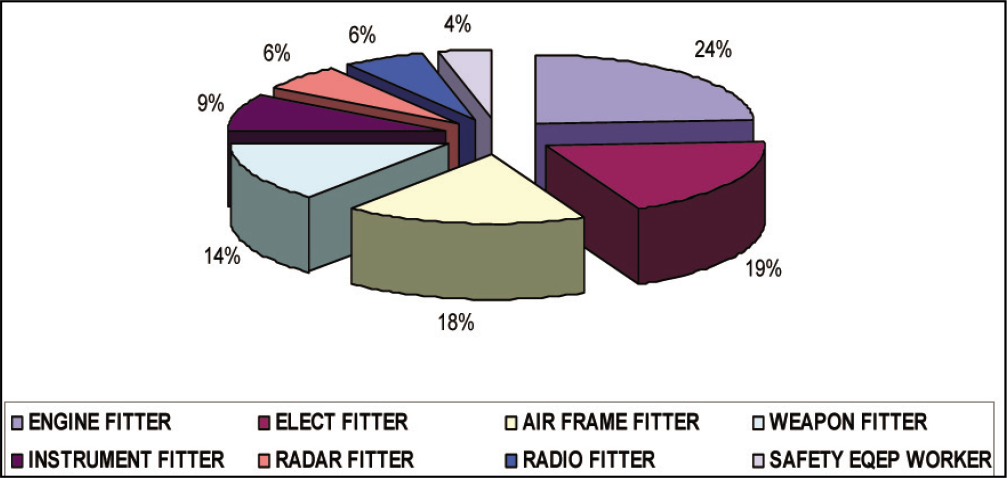
- Trade wise subject distribution (n=100)
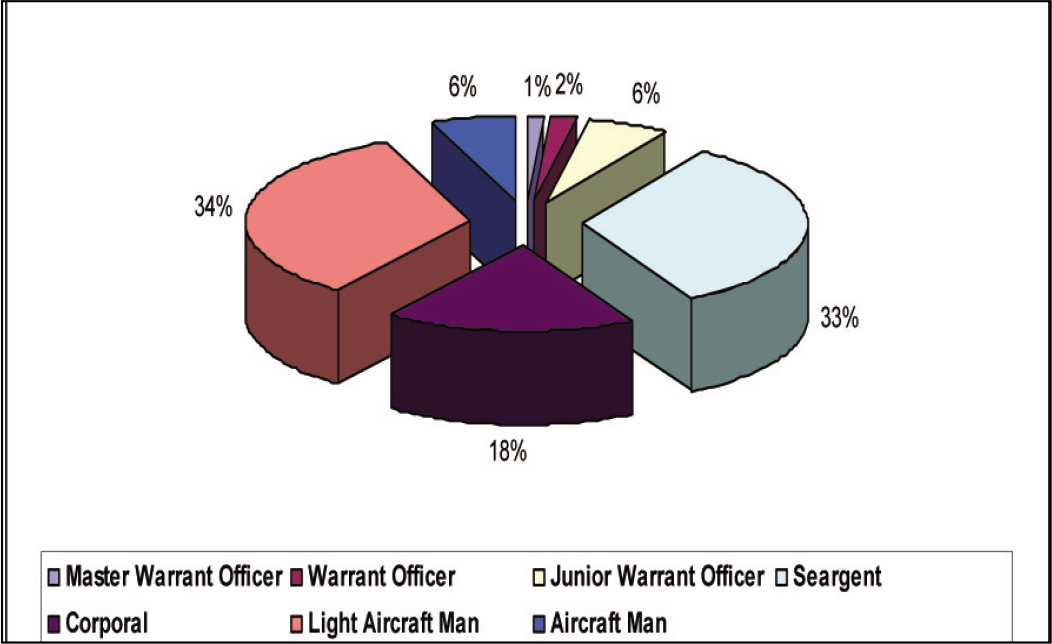
- Rank wise subject distribution (n=100)
The workers involved in both first line servicing as well as second-line servicing of the aircraft feel that their working period is invariably prolonged and extended beyond the normal working hours. They invariably follow a shift system which rotates round the clock to meet the requirements of day and night operations. The shift system involves three shifts – morning, afternoon and night shift. The hours of duty per shift per day depends upon the trade of the individual as well as available manpower (Fig 3).
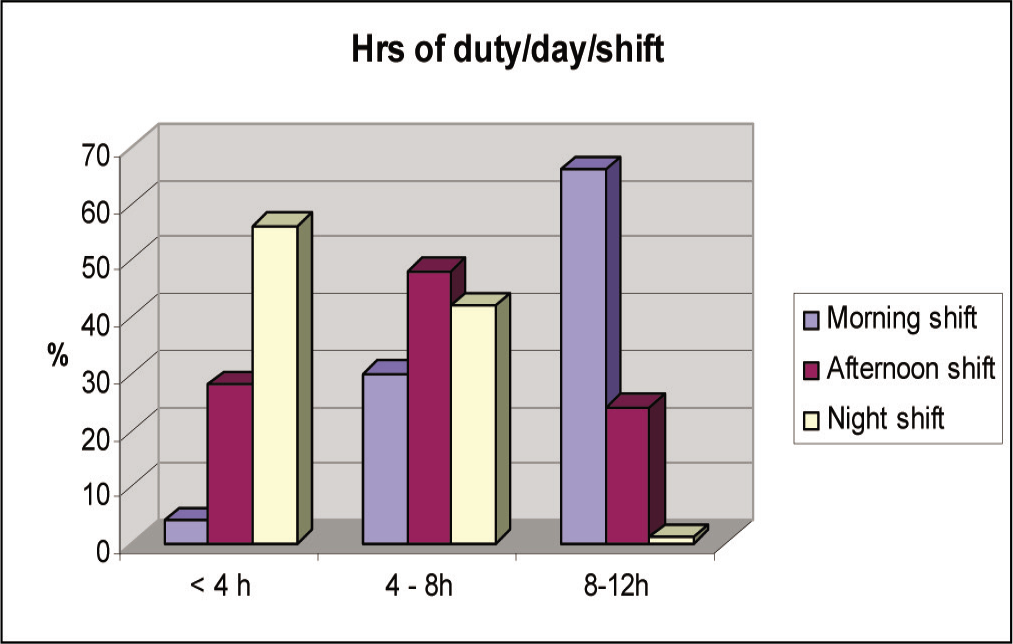
- Hrs of duty/day/shift
Majority of the personnel work more than 8 hrs in morning shift, between 4 to 8 hrs in afternoon shift and less than 4 hrs in night shift. The frequency of shift work is usually 2-4 / week. The shift system being followed was graded as very good (5%), good (18%), satisfactory (64%), unsatisfactory (2%) (Fig 4). 11 % of these personnel feels that this system requires a change. The main reason behind this is difficulty in manning three shifts due to lack of adequate man power and consequent increase in work load. Even though there is a permissible laid down limit for shift duty, this limit is invariably exceeded (Fig - 5).
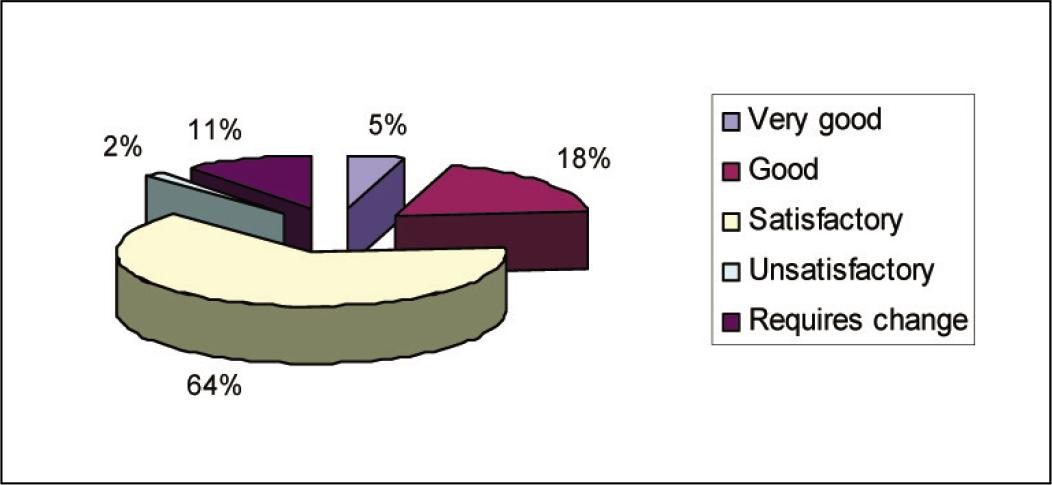
- Grade the shift system
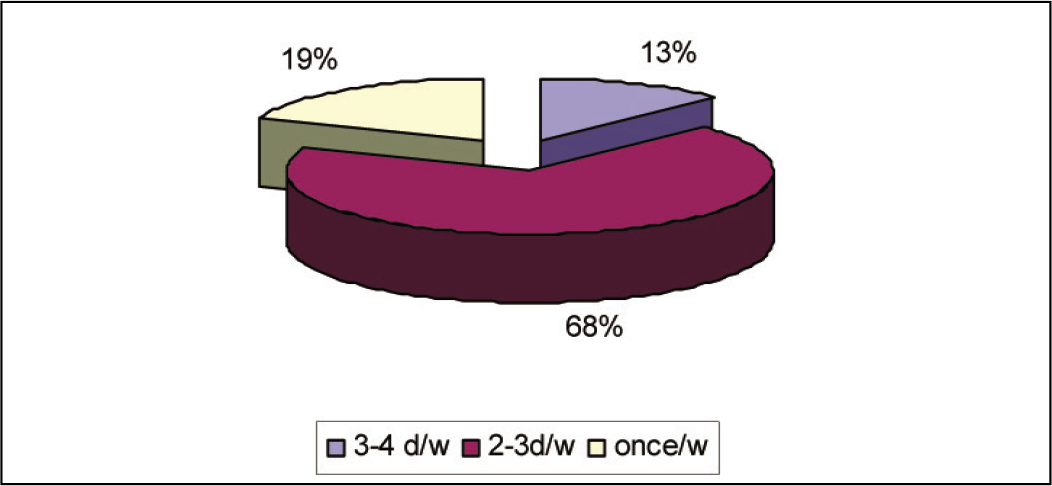
- Exceeding permissible limit in shift system (n=100)
After a night shift, 65% of the subjects feels that they get between 6 – 12 h of sleep and 32% feels that they get less than 6 hrs of sleep (Fig 6). 72 % of them agrees that they get regular weekly offs and in 60% of the cases, it usually coincides with the weekends. On an average they stay 3-5 days away from the base in a month. Majority of the individuals are assigned with secondary duties and this affects primary duty (72 %) and family duty (32%). On an average 42 % of them feels that they do not spend quality time with their family.
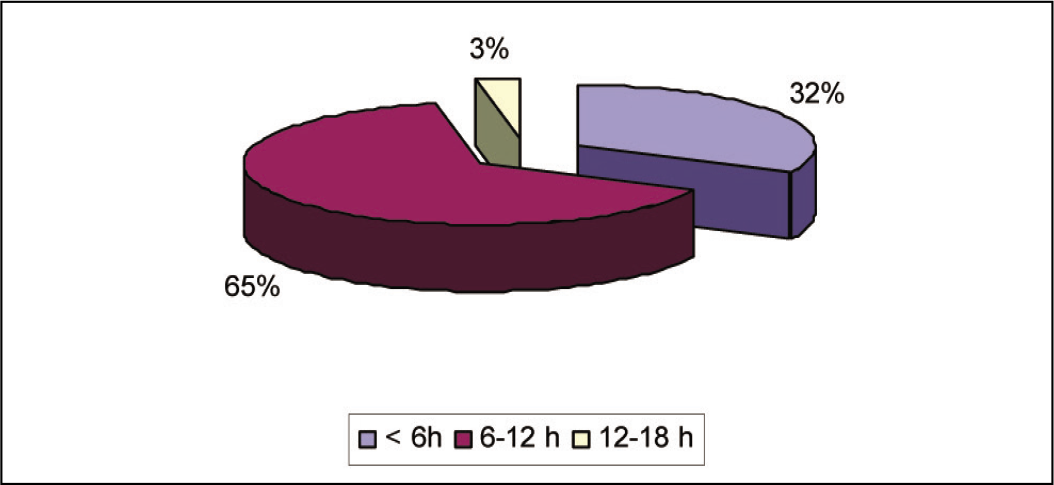
- Hrs of rest after night shift (n=100)
Getting sleep for less than 6 h / day is considered significant. Again as the rotating schedules change frequently, the workers can not get completely adapted to a set work schedule and sleep pattern. These factors may disrupt the sleep pattern and circadian rhythm and could have a significant impact on physical and psychological wellbeing and consequent onset of fatigue. Further, shift work and night duties have been variously reported in literature to interfere with family and social life [7].
Maintenance personnel are subjected to various unusual stressors and there is a likelihood that they develop early fatigue [7]. The normal 6 – 8 hrs of sleep is achieved by only 62 % and 36% of the individual reported that they get even less than 6 hrs per day (Fig 7). The sleep quality was reported to be satisfactory by 66 % and unsatisfactory by 44%. Inadequate sleep was mainly attributed to extended duty hrs, irregular shift schedule and mental stress and was largely occupational in nature. Sleep loss was again accumulative in many of these personnel and could be an important cause of fatigue and tiredness [5, 6].
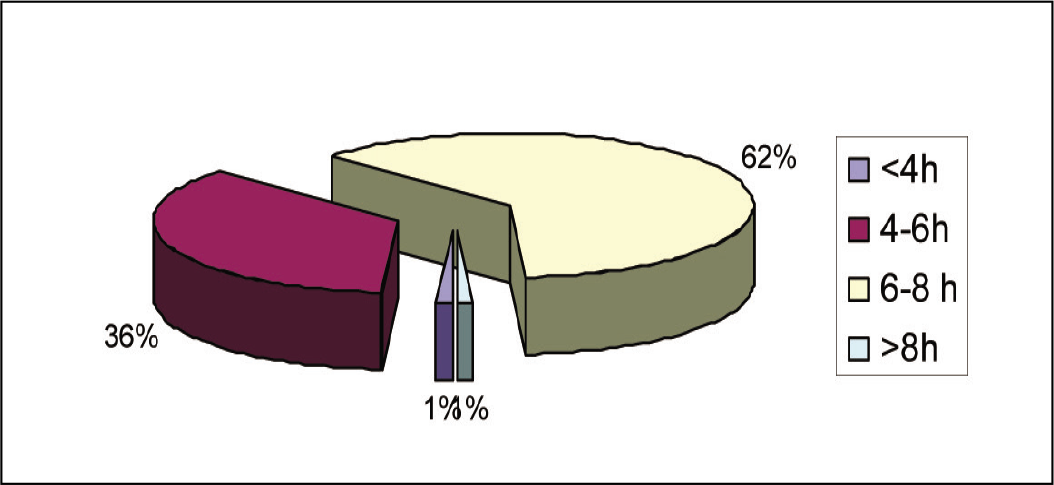
- Hrs of sleep per day (n=100)
The possible factors that make maintenance duty more fatiguing is depicted in Fig 8. Among the significant factors are long duty hrs, early start to the day, shift duty, irregular sleep pattern, uncertainty of duty hrs, uncomfortable workspace and social issues.
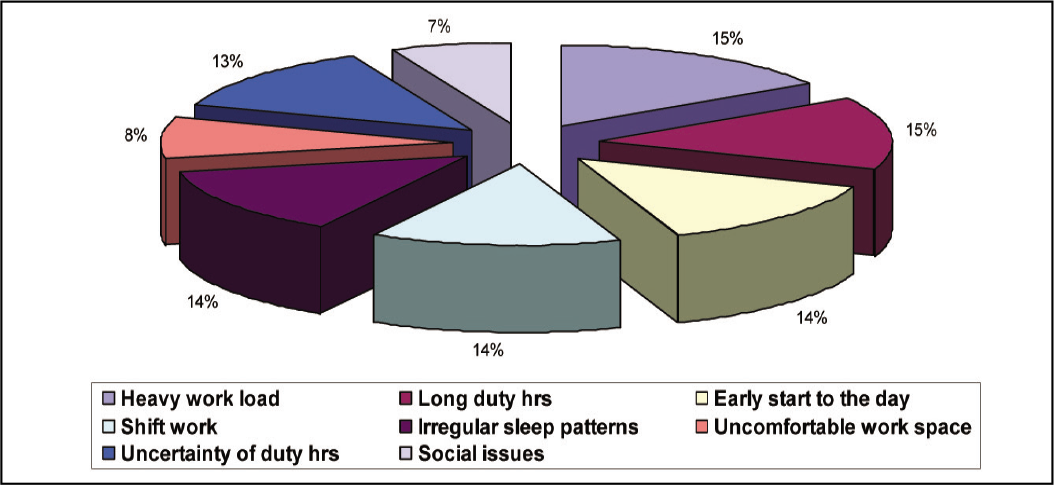
- Factors leading to fatigue (n=100)
Detailed probing was done into the factors leading to fatigue on a prevalence scale (PS) and significance scale (SC) on a score of 1 -10 (Table-1). The important factors which were rated high were increased work load (PS - 6.75, SS – 7.3), shift duty (PS-5.8, SS-6.0), inadequate sleep (PS-5.31, SS-8.22), mental stress (PS- 6.42, SS- 7.45), secondary duties (PS- 4.56, SS- 6.22), extended working hrs (PS- 4.52, SS-5.64), inadequate time to relax (PS- 4.12, SS- 4.6).
| Sl. No. | Factors | Prevalence scale (PS) | Significance scale (SS) |
|---|---|---|---|
| 1 | Increased work load | 6.75 | 7.3 |
| 2 | Inadequate time to relax | 4.12 | 4.6 |
| 3 | Decreased work load | 1.71 | 4.2 |
| 4 | Extended working hrs | 4.52 | 5.64 |
| 5 | Shift duty | 5.8 | 6.0 |
| 6 | Secondary duties | 4.56 | 6.22 |
| 7 | Inadequate rest | 3.6 | 4.28 |
| 8 | Inadequate sleep | 5.31 | 8.22 |
| 9 | Irregular meals | 2.83 | 3.84 |
| 10 | Visual strain | 3.68 | 2.67 |
| 11 | Mental stress | 6.42 | 7.45 |
| 12 | Physical illness | 2.73 | 5.8 |
| 13 | Domestic stress | 3.12 | 4.2 |
| 14 | Illness among family members | 1.78 | 4.6 |
| 15 | Disturbed social life | 1.63 | 5.58 |
| 16 | Late night parties | 1.15 | 3.82 |
| 17 | Alcohol intake in previous 2 days | - | 2.87 |
| 18 | Self medication | - | 3.6 |
Fatigue manifests in these personnel in various ways such as getting up with a lousy feeling (42%), laziness (75%), sleepiness (56 %), loss of concentration (63%), body aches (36 %), irritated feelings (28%), early loss of temper (17 %), do not feel like talking to others (9%). These are the normal outcomes of fatigue and can affect performance of duties and inter personal communication [5,6].
Fatigue significantly affects performance of aircraft maintenance personnel. The subjects were assessed on an operational significance scale of 1 – 10 (1 being the minimum and 10 being the maximum), how fatigue affects various performance parameters (Fig - 9). Decreased attention (6.54), lapses in concentration (5.22), decreased vigilance (4. 97), increased reaction time (4.63) and impaired reasoning (4.14) was rated high. The affect of fatigue was rated to be 3.85 for emergency handling and 2.8 for system handling. All these factors can have a severe impact on working efficiency in ground operations.
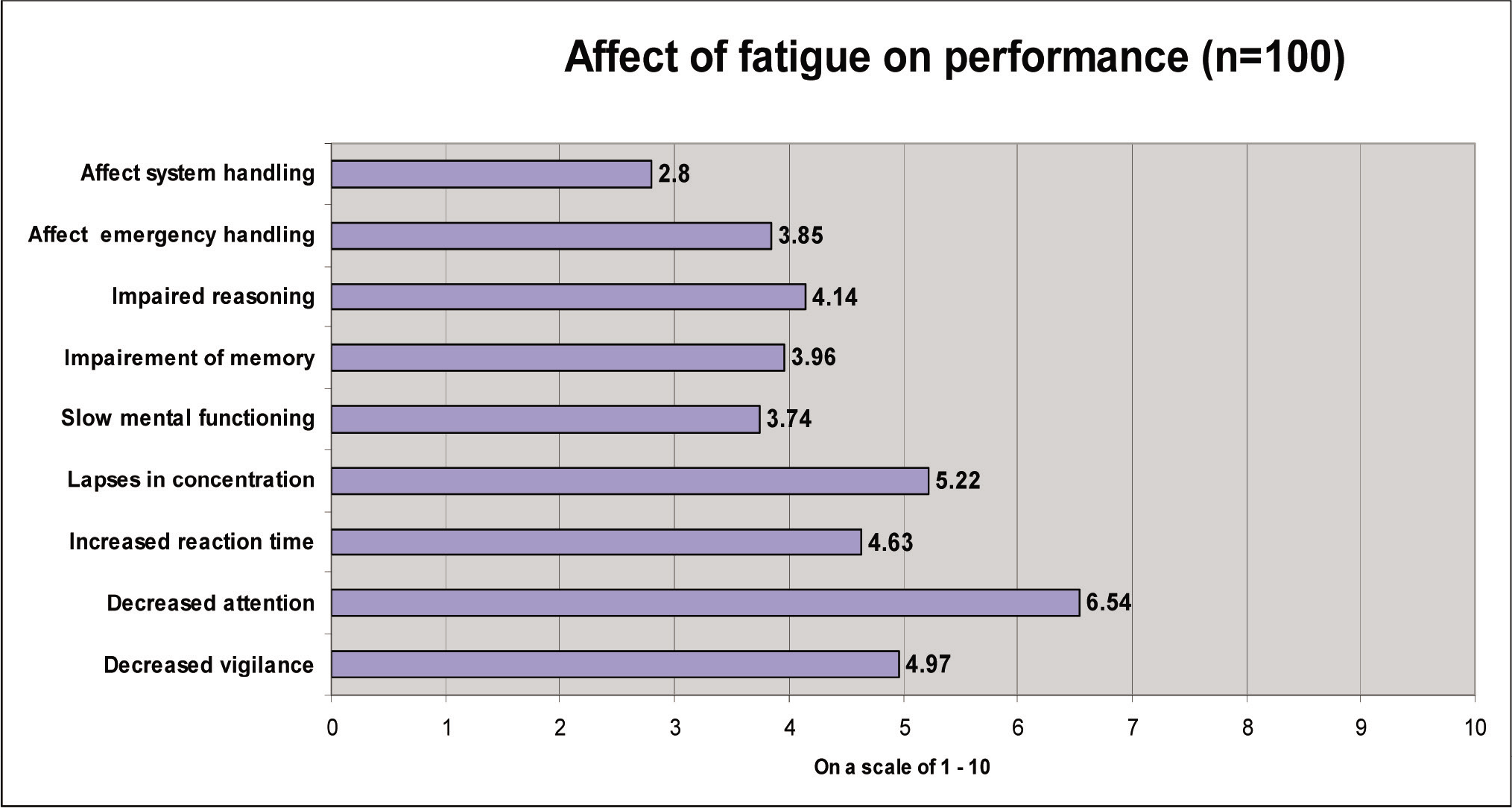
- Effects of Fatigue on Performance
Methods implemented by these personnel to counteract fatigue are subjective and involves exercising and involvement in recreational activities, games and sports, taking rest and adequate sleep in subsequent days. Smoking as a mitigating method is used by few people. However, these are highly individualized and there is no fatigue management strategy followed at organizational level.
The present study revealed few important factors pertaining to work rest schedule and fatigue in aircraft maintenance job which are operationally relevant and have potential human factor implications. However, there are few inherent limitations in the study. Firstly, the study was entirely questionnaire based subjective study. The questionnaire was designed indigenously and validation of the questionnaire was beyond the scope of the study. Secondly, the study was undertaken in only one fighter base. The outcome would have been different if the study could have been extended to other fighter bases. Similarly, the data from transport and helicopter bases possibly would have different results.
Recommendations
Provision of adequate manpower would reduce extended working period, irregularities in work schedule and consequent workload on these individuals and enhance job rotation and job pacing.
Fatigue management program should be designed and executed at unit level. An SOP on duty time limitation on aircraft maintenance duty may be formulated and strictly followed. Duty time limitation must take into consideration requirement of shift duty and rest period.
QUESTIONNAIRE
A study is being conducted on ‘Work-rest Schedule and Fatigue Among Aircraft Maintenance Personnel”. The aim of the study was to understand the shift work and work-rest cycles and fatigue as a human factor issue in aircraft maintenance personnel during piece-time fighter operation. The study is purely for research and the results will be utilised to find appropriate remedial measures. Following are a set of questions that has to be answered. The questionnaire pertains to your personal information, work-rest schedule and fatigue as a human factor issue in aircraft maintenance job. Please answer the questions frankly and freely to enable us to get an honest appreciation of your opinion. Your answer will remain confidential with the research worker and will not lead to any administrative action or in any way affect you in your career or your medical examination.
You are to refrain from making any comment on personal problems. You have a choice to answer the questionnaire anonymously with an assurance that this will not have any adverse impact on you. In case you do not understand any question, you are welcome to ask for clarification. Your wholehearted participation will be appreciated.
PART ‘A’: PERSONAL INFORMATION
1. Name (Optional)_____________________________________________________ 2. Age _______________
3. Rank _____________________________________________ 4.Trade ______________________________
5. Yrs of service_________________________ 6. Yrs of service in the present role _______________________
7. Academic Qualification______________________________________________________________________
8. Married ⎕ Single ⎕ Number of Children____________________________
9. What is the present role in the unit? Administrator ⎕ Supervisor ⎕ Active worker ⎕
10. Courses undertaken to reach the present designation ______________________________________________
11. Present Medical Category_________________________________________________
12. If in LMC, please state the disability & date of last review and also No. of years in LMC________________________________________________________________________________________________________________________________________________________________________________________________
13. If in LMC, does your disability affect the tasks associated with your responsibility?
__________________________________________________________________________________________________________________________________________________________________________________
14. Special allowance if any drawn for the task _______________________________________________________________________________________________________________________________________________________________________________________________________________________________________
PART ‘B’- WORK-REST SCHEDULE
1. Total Duration of exposure to maintenance task: ______ Years ______ Months
2. Duration in your present role? ____________ Years ___________ Months
3. Would you briefly define the tasks associated with your present designation?
____________________________________________________________________________________________________________________________________________________________________________________________________________________________________________________________________________________________________________________________________________________________________
4. Are you following a shift system? Yes ⎕ No ⎕
5. On an average how many hours of duty you do during routine working? Put a tick (√) on the most appropriate response according to you:
6. Aircraft Maintenance during the DAY Shift
DAY Less than 4 Hrs ⎕ 4-8 Hrs ⎕ 8-12 Hrs ⎕More than 12 Hrs⎕
WEEK Less than 25 Hrs ⎕ 25-50 Hrs ⎕ 50-75 Hrs ⎕More than 75 Hrs⎕
MONTH Less than 100 Hrs ⎕ 100-200 Hrs ⎕ 200-300 Hrs⎕ More than 300 Hrs⎕
7. Aircraft Maintenance during the AFTERNOON Shift
DAY Less than 4 Hrs ⎕ 4-8 Hrs ⎕ 8-12 Hrs ⎕More than 12 Hrs⎕
WEEK Less than 25 Hrs ⎕ 25-50 Hrs ⎕ 50-75 Hrs ⎕More than 75 Hrs⎕
MONTH Less than 100 Hrs ⎕ 100-200 Hrs ⎕ 200-300 Hrs ⎕More than 300 Hrs⎕
8. Aircraft Maintenance during the NIGHT Shift
DAY Less than 4 Hrs ⎕ 4-8 Hrs ⎕ 8-12 Hrs ⎕More than 12 Hrs⎕
WEEK Less than 25 Hrs ⎕ 25-50 Hrs ⎕ 50-75 Hrs ⎕More than 75 Hrs⎕
MONTH Less than 100 Hrs ⎕ 100-200 Hrs ⎕ 200-300 Hrs ⎕More than 300 Hrs⎕
9. What is the frequency of shift work / week?
Day shift: Less than 2⎕ 2 - 4 ⎕ 4 - 6 ⎕More than 6⎕
Afternoon shift: Less than 2 ⎕ 2 - 4⎕ 4 - 6 ⎕More than 6⎕
Night shift: Less than 2⎕ 2 - 4 ⎕ 4 - 6⎕ More than 6⎕
10. How do you grade the system being followed/ planned for the shift system?
Very Good⎕ Good ⎕Satisfactory⎕
Unsatisfactory ⎕Requires change⎕
If below satisfactory please comment on the same___________________________________________________________________________________________________________________________________________________________________________________________________________________________________
11. What are the constraints you face while on shift duty, related to your role?
___________________________________________________________________________________________________________________________________________________________________________________________________________________________________________________________________________
Is there a laid down permissible limit in shift system? Yes ⎕ No ⎕
If yes, specify______________________________________________________________________________
12. Do you exceed permissible limits in the shift system, if yes specify how often?
Daily ⎕ 3-4 days/week ⎕ 2-3 days/week ⎕Once a week⎕
Once fortnightly ⎕Never⎕
If any other please specify ___________________________________________________________________
13. How many hours of rest do you get after a night shift?
Less than 6 Hrs ⎕ 6 – 12 Hrs ⎕ 12 – 18 Hrs ⎕ 18 – 24 Hrs ⎕More than 24 Hrs⎕
14. How often does the system have maintenance day?
Weekly ⎕Monthly ⎕Quarterly ⎕Half Yearly ⎕Yearly Never⎕
15. Are you given any secondary duties? If Yes, please list them ___________________________________________________________________________________________________________________________________________________________________________________________________________________________________________________________________________________________________________________
16. How much time do you spend on your secondary duties on a weekly basis?
Less than 4 Hrs ⎕ 4–8 Hrs ⎕ 8–12 Hrs ⎕ 12–16 Hrs ⎕ 16– 20 Hrs ⎕More than 20 Hrs⎕
17. Whether Secondary duties affect
Primary duties Yes⎕ No⎕
Family duties Yes⎕ No⎕
18. How often do you stay away from the base in a month ?___________________________________________
19. Do you spend quality time with your family? Yes ⎕No⎕
If no, why?______________________________________________________________________________
20. Do you get regular weekly offs? If yes, do they coincide with weekends? Yes⎕ No⎕
21. What are the factors that lead to stress while performing duty? _______________________________________________________________________________________________________________________________________________________________________________________________________________________________________________________________________________________________________________________________________________________________________________________________________________________________________________________________________________________________
PART ‘C’ - FATIGUE AS A HUMAN FACTOR ISSUE
1. How many hours of sleep do you get in 24 hours?
Less than 4 Hrs ⎕ 4 – 6 Hrs ⎕ 6 – 8 Hrs ⎕More than 8 Hrs⎕
2. Are you satisfied with the hours of sleep you get in a working day? Yes ⎕ No ⎕
3. Do you feel fatigued/ tired following a normal schedule of duty? Yes ⎕ No ⎕
4. Do you agree that secondary duty adds on to the onset of fatigue? Yes ⎕ No ⎕
If yes, mention the way it contributes __________________________________________________________
_________________________________________________________________________________________
5. According to you what are the probable factors for fatigue on Aircraft Maintenance duty?
6. What are the possible factors that make Aircraft Maintenance more fatiguing?
Heavy work load Yes ⎕ No ⎕
Long duty hours Yes ⎕ No ⎕
Early start to the day Yes ⎕ No ⎕
Irregular shift work Yes ⎕ No ⎕
Irregular sleep pattern Yes ⎕ No ⎕
Uncomfortable work space Yes ⎕ No ⎕
Uncertainty of flight schedule Yes ⎕ No ⎕
Missing important social commitments Yes ⎕ No ⎕
Any other, please specify ____________________________________________________________________
7. In your opinion if you feel that the under mentioned factors are the possible causes of fatigue, rate them in prevalence and significance on a rating scale of 1 to 10.
| [Prevalence scale (PS) [Significance scale (SS) |
1- very uncommon 1 – does not affect much |
10 – highly prevalent] 10 – highly significant] |
|---|---|---|
| PS | SS | |
| Increased workload intensity | _____________ | _____________ |
| Inadequate time to relax | _____________ | _____________ |
| Decreased workload intensity | _____________ | _____________ |
| Extended work hours (With no significant work to do) | _____________ | _____________ |
| Shift duty | _____________ | _____________ |
| Secondary duties | _____________ | _____________ |
| Inadequate rest | _____________ | _____________ |
| Sleep loss / Inadequate sleep | _____________ | _____________ |
| Inadequate / irregular meals | _____________ | _____________ |
| Visual strain | _____________ | _____________ |
| Mental stress | _____________ | _____________ |
| Physical illness | _____________ | _____________ |
| Domestic stress | _____________ | _____________ |
| Illness among family members | _____________ | _____________ |
| Disturbed social life | _____________ | _____________ |
| Late night parties | _____________ | _____________ |
| Alcohol intake in the previous 2 days | _____________ | _____________ |
| Self medication | _____________ | _____________ |
| Others (please specify) | ||
| __________________________________________________________________________________________________________________________________________________________________________________ | ||
8. How does fatigue manifest or how do you recognize fatigue in yourself?
Get up with a lousy feeling⎕ Feel lazy⎕
Loss of concentration⎕ Feel irritated⎕
Early loss of temper⎕ Body aches ⎕
Do not feel like talking to others⎕ Sleepiness ⎕
Others (please specify) ___________________________________________________________________________________________________________________________________________________________
9. In your opinion how does fatigue affect performance of Aircraft Maintenance personnel?
Operational Significance (Scale of 1 – 10 with 10 being max)
Decreased vigilance Yes No _____________
Decreased attention Yes No _____________
Increased reaction time Yes No _____________
Lapses in concentration Yes No _____________
Slow mental arithmetic Yes No _____________
Impairment of memory Yes No _____________
Impaired reasoning Yes No _____________
Affect emergency handling Yes No _____________
Affect system handling Yes No _____________
_________________________________________________________________________________________
10. How do you cope up with the disability due to fatigue?
Exercise⎕ Games/ sports⎕
Smoke⎕ Drink alcohol⎕
Micro sleeps⎕ Rest⎕
Soft drinks⎕
Take some days off and pack off for some recreation⎕
Do nothing about it, as it happens very often⎕
Others (please specify) _____________________________________________________________________________________________________________________________________________________________
11. Do you think that you are benefited by employing the above measures? Yes⎕ No⎕
12. In your opinion what are the measures required to reduce fatigue due to aircraft maintenance?
___________________________________________________________________________________________________________________________________________________________________________________________________________________________________________________________________________
The researchers, thank you sincerely for your time and effort in completing this survey
References
- RTO Lecture Series 223 RTO-EN-016 AC/323(HFM-064) TP/39, North Atlantic Treaty Aerospace Medical Association Aerospace Fatigue Countermeasures Subcommittee of the Aerospace Human Factors Committee. Fatigue countermeasures in aviation. Aviat Space Environ Med. 2009;80:29-59.
- [Google Scholar]
- Department of Employment and Industrial Relation, Queensland Government [Internet] [cited 2018 Jan 10] Available at: http://www.deir.qld.gov.au
- [Google Scholar]
- Sustained Carrier Operations: Sleep Loss Performance and Fatigue Countermeasures, by David F Neri, David F Dinges and Mark R Rosekind[Internet] [Cited 2017 Mar 17] Available at http://www.human-factors.arc.nasa.gov
- [Google Scholar]






